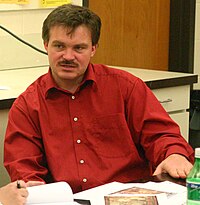Nikolai pit
Nikolai K. Grube (born June 6, 1962 in Bonn ) is a German ancient Americanist and author who works primarily in the field of Mayan research and especially Mayan inscriptions .
Life
Nikolai Grube was fascinated by archeology from an early age; already in his school days he published his first work on the Maya . He studied ancient American studies , ethnology , ancient oriental studies and indology at the University of Hamburg . There he completed his doctorate in 1989, after which he moved to Bonn. Together with the Roemer and Pelizaeus Museum in Hildesheim , he organized the international exhibition Die Welt der Maya , which took place in Hildesheim, Vienna, Mannheim and Cologne. From 1992 to 1995 he received a habilitation grant from the German Research Foundation (DFG) for the Orale Traditions der Cruzoob -Maya project in Mexico , where he also had the opportunity to take part in various research projects in Guatemala , Mexico, Belize and Honduras . In 1999 he completed his habilitation in ethnology, again in Bonn, and in the same year he received a Heisenberg grant from the DFG. From 2000 to 2004 he held the Linda and David Schele Chair at the University of Texas at Austin . His main research interests were the emergence of early states and writing systems in pre-Hispanic Mesoamerica , the ethnolinguistics of the Maya languages and the cultural revitalization movements of Indian groups. In April 2004, Grube took up the C4 professorship for Ancient American Studies and Ethnology at the Rheinische Friedrich-Wilhelms University in Bonn , succeeding Hanns Jürgen Prem as managing director of the Institute for Ancient American Studies and Ethnology (IAE) (now the Department of Ancient American Studies ).
Nikolai Grube's research regularly takes him to the areas of the Maya and other Indian cultures in Central America. He pays a lot of attention to the relationship between the Maya and Teotihuacáns cultures , the competition between Tikal and Calakmul at the end of the classical Maya period, but also to the later history of the Maya and their present.
Since 2014, Grube has been the project manager of the “ Text database and dictionary of Classical Maya ” project, which researches the script and language of pre-Hispanic Mayan culture. It was established in 2014 by the North Rhine-Westphalian Academy of Sciences and Arts at the Friedrich-Wilhelms-Universität Bonn and has a term of 15 years.
Field research
- 1984, 1986–1998, 2001: Work lasting several months annually in Señor and Tixcacal Guardia ( Quintana Roo , Mexico) as well as in the Cayo District of Belize on the history of the Yucatec Maya.
- Taking up oral traditions; Research on genres of verbal art to explore oral traditions (20 months total).
- 1987–1993, 1998: Research stays in Copán (Honduras) - collaboration with David Stuart and Linda Schele .
- 1989–1992, 1994, 1995: Project Epigrapher in the Caracol Project, Belize (lead: Arlen and Diane Chase ) (one month every year).
- 1990, 1991, 1995 – today: Expeditions lasting several weeks in the Petén district (Guatemala) to rescue and document hieroglyphic inscriptions.
literature
- Los Mayas: una civilización milenaria , Könemann , Hamburg 2006, ISBN 978-3-8331-1959-0
- Maya, god kings in the rainforest , hfullmann publishing GmbH, Potsdam 2012, ISBN 978-3-8480-0033-3
- The Dresden Maya Calendar: The Complete Codex. Herder Verlag, Freiburg, 2012, ISBN 978-3-451-33332-3
See also
Web links
- Literature by and about Nikolai Grube in the catalog of the German National Library
- Nikolai Grube in the Internet Movie Database (English)
- Nikolai Grube at the North Rhine-Westphalian Academy of Sciences and Arts
- Interview with Nikolai Grube from Planet Wissen
- The rise and fall of Mayan culture ( Memento from February 1, 2008 in the Internet Archive ) TV show with Nikolai Grube on NDR
- Nikolai Grube on the website of the Department of Ancient American Studies at the University of Bonn
- Mayan explorers pit. With a machete to the end of the world, by Petra Pluwatsch in the Kölner Stadt-Anzeiger on December 29, 2009
- List of publications by Nikolai Grube (PDF; 163 kB)
- new texts and images in Maya and Teotihuacan style from La Sufricaya, Petén, Guatemala (a project by N. Grubes from 2005/06; English)
| personal data | |
|---|---|
| SURNAME | Pit, Nikolai |
| ALTERNATIVE NAMES | Grube, Nikolai K. |
| BRIEF DESCRIPTION | German Old Americanist; Mayan researcher and specialist in Mayan inscriptions |
| DATE OF BIRTH | June 6, 1962 |
| PLACE OF BIRTH | Bonn |
